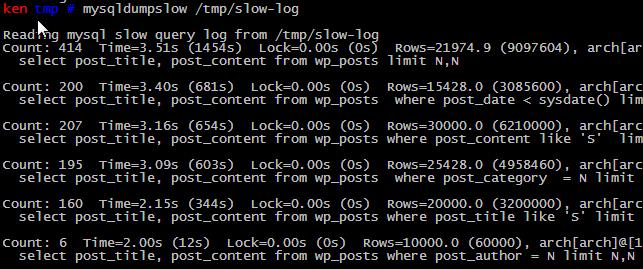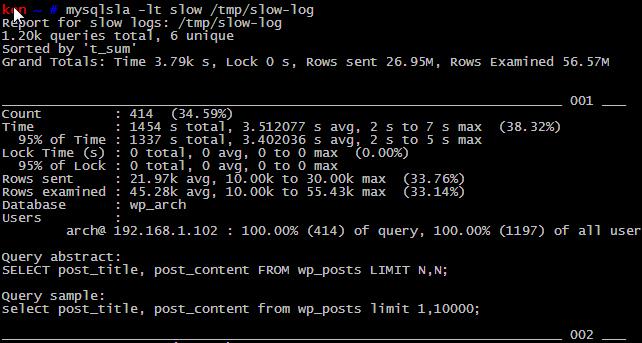慢查询有什么用?
它能记录下所有执行超过long_query_time时间的SQL语句,帮你找到执行慢的SQL,方便我们对这些SQL进行优化。
测试用 MySQL 版本。
Server version: 5.6.10-log Source distribution
未做任何慢日志设置时。
mysql> show variables like "%query%"; +------------------------------+--------------------------------------+ | Variable_name | Value | +------------------------------+--------------------------------------+ | binlog_rows_query_log_events | OFF | | ft_query_expansion_limit | 20 | | have_query_cache | YES | | long_query_time | 10.000000 | | query_alloc_block_size | 8192 | | query_cache_limit | 1048576 | | query_cache_min_res_unit | 4096 | | query_cache_size | 1048576 | | query_cache_type | OFF | | query_cache_wlock_invalidate | OFF | | query_prealloc_size | 8192 | | slow_query_log | OFF | | slow_query_log_file | /usr/local/mysql/data/Betty-slow.log | +------------------------------+--------------------------------------+ 13 rows in set (0.01 sec) mysql>
修改配置文件,开启 slow log 。
[root@Betty data]# vi /etc/my.cnf # For advice on how to change settings please see # http://dev.mysql.com/doc/refman/5.6/en/server-configuration-defaults.html # *** DO NOT EDIT THIS FILE. It's a template which will be copied to the # *** default location during install, and will be replaced if you # *** upgrade to a newer version of MySQL. [mysqld] # Remove leading # and set to the amount of RAM for the most important data # cache in MySQL. Start at 70% of total RAM for dedicated server, else 10%. # innodb_buffer_pool_size = 128M # Remove leading # to turn on a very important data integrity option: logging # changes to the binary log between backups. log_bin=mysql-bin slow_query_log=on slow_query_log_file=mysql-slow long_query_time=2 # These are commonly set, remove the # and set as required. # basedir = ..... # datadir = ..... # port = ..... # server_id = ..... # socket = ..... # Remove leading # to set options mainly useful for reporting servers. # The server defaults are faster for transactions and fast SELECTs. # Adjust sizes as needed, experiment to find the optimal values. # join_buffer_size = 128M # sort_buffer_size = 2M # read_rnd_buffer_size = 2M sql_mode=NO_ENGINE_SUBSTITUTION,STRICT_TRANS_TABLES [mysql] socket = /tmp/mysql.sock
重启 MySQL 。
[root@Betty data]# /etc/init.d/mysql restart Shutting down MySQL.. [ OK ] Starting MySQL. [ OK ] [root@Betty data]#
查看 slow log 。
[root@Betty data]# ll mysql-slow -rw-rw---- 1 mysql mysql 719 Sep 6 12:43 mysql-slow
重新查看系统变量值。
mysql> mysql> show variables like "%query%"; +------------------------------+------------+ | Variable_name | Value | +------------------------------+------------+ | binlog_rows_query_log_events | OFF | | ft_query_expansion_limit | 20 | | have_query_cache | YES | | long_query_time | 2.000000 | | query_alloc_block_size | 8192 | | query_cache_limit | 1048576 | | query_cache_min_res_unit | 4096 | | query_cache_size | 1048576 | | query_cache_type | OFF | | query_cache_wlock_invalidate | OFF | | query_prealloc_size | 8192 | | slow_query_log | ON | | slow_query_log_file | mysql-slow | +------------------------------+------------+ 13 rows in set (0.00 sec) mysql>
查看新生成的 slow log 的内容。
[root@Betty data]# cat mysql-slow /usr/local/mysql/bin/mysqld, Version: 5.6.10-log (Source distribution). started with: Tcp port: 0 Unix socket: (null) Time Id Command Argument [root@Betty data]#
测试 slow log 。
mysql> mysql> select 1; +---+ | 1 | +---+ | 1 | +---+ 1 row in set (0.00 sec) mysql> mysql> select sleep(1); +----------+ | sleep(1) | +----------+ | 0 | +----------+ 1 row in set (1.00 sec) mysql> mysql> mysql> select sleep(3); +----------+ | sleep(3) | +----------+ | 0 | +----------+ 1 row in set (3.00 sec) mysql> mysql> select sleep(4); +----------+ | sleep(4) | +----------+ | 0 | +----------+ 1 row in set (4.01 sec) mysql> mysql> mysql> select sleep(5); +----------+ | sleep(5) | +----------+ | 0 | +----------+ 1 row in set (5.00 sec) mysql> select sleep(2); +----------+ | sleep(2) | +----------+ | 0 | +----------+ 1 row in set (2.01 sec) mysql> mysql> select sleep(1); +----------+ | sleep(1) | +----------+ | 0 | +----------+ 1 row in set (1.00 sec) mysql> select 2; +---+ | 2 | +---+ | 2 | +---+ 1 row in set (0.00 sec) mysql>
查看此时 slow log 的内容。
[root@Betty data]# cat mysql-slow /usr/local/mysql/bin/mysqld, Version: 5.6.10-log (Source distribution). started with: Tcp port: 0 Unix socket: (null) Time Id Command Argument # Time: 130906 12:52:51 # User@Host: root[root] @ localhost [] Id: 1 # Query_time: 3.002864 Lock_time: 0.000000 Rows_sent: 1 Rows_examined: 0 SET timestamp=1378443171; select sleep(3); # Time: 130906 12:53:01 # User@Host: root[root] @ localhost [] Id: 1 # Query_time: 4.001943 Lock_time: 0.000000 Rows_sent: 1 Rows_examined: 0 SET timestamp=1378443181; select sleep(4); # Time: 130906 12:53:09 # User@Host: root[root] @ localhost [] Id: 1 # Query_time: 5.002093 Lock_time: 0.000000 Rows_sent: 1 Rows_examined: 0 SET timestamp=1378443189; select sleep(5); # Time: 130906 12:53:15 # User@Host: root[root] @ localhost [] Id: 1 # Query_time: 2.002984 Lock_time: 0.000000 Rows_sent: 1 Rows_examined: 0 SET timestamp=1378443195; select sleep(2); [root@Betty data]#
实验:
a. 使用 mysql 自带慢查询日志分析工具 mysqldumpslow 。
[root@Betty data]# mysqldumpslow mysql-slow Reading mysql slow query log from mysql-slow Count: 4 Time=3.50s (14s) Lock=0.00s (0s) Rows=1.0 (4), root[root]@localhost select sleep(N) [root@Betty data]#
b. 使用 hackmysql.com 推出的一款日志分析工具 mysqlsla 。
[root@Betty data]# mysqlsla -lt slow mysql-slow
Report for slow logs: mysql-slow
4 queries total, 1 unique
Sorted by 't_sum'
Grand Totals: Time 14 s, Lock 0 s, Rows sent 4, Rows Examined 0
______________________________________________________________________ 001 ___
Count : 4 (100.00%)
Time : 14.009884 s total, 3.502471 s avg, 2.002984 s to 5.002093 s max (100.00%)
Lock Time (s) : 0 total, 0 avg, 0 to 0 max (0.00%)
Rows sent : 1 avg, 1 to 1 max (100.00%)
Rows examined : 0 avg, 0 to 0 max (0.00%)
Database :
Users :
root@localhost : 100.00% (4) of query, 100.00% (4) of all users
Query abstract:
SET timestamp=N; SELECT sleep(N);
Query sample:
SET timestamp=1378443171;
select sleep(3);
[root@Betty data]#
c. 使用德国人写的 mysql_explain_slow_log 。(不知道为什么未统计出信息)
[root@Betty WGET_DIR]# ./mysql_explain_slow_log --user=root --password= --socket=/tmp/mysql.sock < /usr/local/mysql/data/mysql-slow mysql_explain_slow_log ====================== Index usage ------------------------------------ Queries causing table scans ------------------- Sum: 0 table scans Summary --------------------------------------- Select: 0 queries Update: 0 queries Load: 0 queries Logfile: 26 lines Started: Fri Sep 6 15:59:13 2013 Finished: Fri Sep 6 15:59:13 2013 [root@Betty WGET_DIR]#
d.
google code 上的一个分析工具 mysql_filter_slow_log (最后更新日期为2007年),提供了 python 和 php 两种可执行的脚本。
[root@Betty WGET_DIR]# python mysql_filter_slow_log.py /usr/local/mysql/data/mysql-slow --no-duplicates --sort-execution-count --top=10 # Execution count: 1 time on 2013-09-06 16:07:23. # Column : avg | max | sum # Query time : 5 | 5 | 5 # Lock time : 0 | 0 | 0 # Rows examined: 0 | 0 | 0 # Rows sent : 1 | 1 | 1 # User@Host: root[root] @ localhost [] Id: 1 SET timestamp=1378454843;select sleep(5); # Execution count: 1 time on 2013-09-06 16:07:15. # Column : avg | max | sum # Query time : 4 | 4 | 4 # Lock time : 0 | 0 | 0 # Rows examined: 0 | 0 | 0 # Rows sent : 1 | 1 | 1 # User@Host: root[root] @ localhost [] Id: 1 SET timestamp=1378454835;select sleep(4); # Execution count: 1 time on 2013-09-06 16:07:01. # Column : avg | max | sum # Query time : 3 | 3 | 3 # Lock time : 0 | 0 | 0 # Rows examined: 0 | 0 | 0 # Rows sent : 1 | 1 | 1 # User@Host: root[root] @ localhost [] Id: 1 SET timestamp=1378454821;select sleep(3); # Execution count: 1 time on 2013-09-06 16:07:28. # Column : avg | max | sum # Query time : 2 | 2 | 2 # Lock time : 0 | 0 | 0 # Rows examined: 0 | 0 | 0 # Rows sent : 1 | 1 | 1 # User@Host: root[root] @ localhost [] Id: 1 SET timestamp=1378454848;select sleep(2); [root@Betty WGET_DIR]#
e. 使用 percona-toolkit 中的 pt-query-digest (在《高性能MySQL》中多次提出,值得使用的工具)。
[root@Betty data]# pt-query-digest --user=root mysql-slow # 120ms user time, 10ms system time, 20.21M rss, 68.70M vsz # Current date: Mon Sep 9 13:21:38 2013 # Hostname: Betty # Files: mysql-slow # Overall: 4 total, 1 unique, 0.15 QPS, 0.52x concurrency ________________ # Time range: 2013-09-06 16:07:01 to 16:07:28 # Attribute total min max avg 95% stddev median # ============ ======= ======= ======= ======= ======= ======= ======= # Exec time 14s 2s 5s 4s 5s 1s 4s # Lock time 0 0 0 0 0 0 0 # Rows sent 4 1 1 1 1 0 1 # Rows examine 0 0 0 0 0 0 0 # Query size 60 15 15 15 15 0 15 # Profile # Rank Query ID Response time Calls R/Call V/M Item # ==== ================== ============== ===== ====== ===== ====== # 1 0xF9A57DD5A41825CA 14.0097 100.0% 4 3.5024 0.36 SELECT # Query 1: 0.15 QPS, 0.52x concurrency, ID 0xF9A57DD5A41825CA at byte 548 # This item is included in the report because it matches --limit. # Scores: V/M = 0.36 # Time range: 2013-09-06 16:07:01 to 16:07:28 # Attribute pct total min max avg 95% stddev median # ============ === ======= ======= ======= ======= ======= ======= ======= # Count 100 4 # Exec time 100 14s 2s 5s 4s 5s 1s 4s # Lock time 0 0 0 0 0 0 0 0 # Rows sent 100 4 1 1 1 1 0 1 # Rows examine 0 0 0 0 0 0 0 0 # Query size 100 60 15 15 15 15 0 15 # String: # Hosts localhost # Users root # Query_time distribution # 1us # 10us # 100us # 1ms # 10ms # 100ms # 1s ################################################################ # 10s+ # EXPLAIN /*!50100 PARTITIONS*/ select sleep(5)\G [root@Betty data]#
慢查询配置项
# I.e. you could add the following lines under the [mysqld] section of your my.ini or my.cnf configuration file: # Log all queries taking more than 3 seconds long_query_time=3 # minimum: 1, default: 10 # MySQL >= 5.1.21 (or patched): 3 seconds = 3000000 microseconds # long_query_time=3.000000 # minimum: 0.000001 (1 microsecond) # Activate the Slow Query Log slow_query_log # >= 5.1.29 # log-slow-queries # deprecated since 5.1.29 # Write to a custom file name (>= 5.1.29) # slow_query_log_file=file_name # default: /data_dir/host_name-slow.log # Log all queries without indexes # log-queries-not-using-indexes # Log only queries which examine at least N rows (>= 5.1.21) # min_examined_row_limit=1000 # default: 0 # Log slow OPTIMIZE TABLE, ANALYZE TABLE, and ALTER TABLE statements # log-slow-admin-statements # Log slow queries executed by replication slaves (>= 5.1.21) # log-slow-slave-statements # MySQL 5.1.6 through 5.1.20 had a default value of log-output=TABLE, so you should force # Attention: logging to TABLE only includes whole seconds information log-output=FILE ## Admin query for online activation is possible since MySQL 5.1 (without server restart) ## SET @@global.slow_query_log=1 ## SET @@global.long_query_time=1 ## Show current variables related to the Slow Query Log ## SHOW GLOBAL VARIABLES WHERE Variable_name REGEXP 'admin|min_examined|log_output|log_queries|log_slave|long|slow_quer'
========= 我是分割线 =========
下面给出网上一篇流传已久的博客文章,供参考(做了部分修正)。
参考:《五款常用mysql slow log分析工具的比较》,原文写于2008年。
mysql slow log 分析工具的比较
mysql 中的 slow log 是用来记录执行时间较长(超过 long_query_time 秒)的 sql 的一种日志工具。
启用 slow log
在 my.cnf 中设置
[mysqld] slow_query_log=on slow_query_log_file=mysql-slow
重启 MySQL 服务。
五款常用工具
- mysqldumpslow
- mysqlsla
- myprofi
- mysql-explain-slow-log
- mysql-log-filter
mysqldumpslow mysql官方提供的慢查询日志分析工具。输出图表如下:

主要功能包括统计不同慢 sql 的
- 出现次数(Count)
- 执行耗费的平均时间和累计总耗费时间(Time)
- 等待锁耗费的时间(Lock)
- 发送给客户端的行总数(Rows)
- 扫描的行总数(Rows)
- 用户以及sql语句本身(抽象了一下格式,比如 limit 1, 20 用 limit N,N 表示)
mysqlsla hackmysql.com 推出的一款日志分析工具(该网站还维护了 mysqlreport,mysqlidxchk 等比较实用的mysql 工具)。

整体来说,功能非常强大。输出的数据报表非常有利于分析慢查询的原因,包括执行频率、数据量、查询消耗等。
格式说明如下:
- 总查询次数 (queries total),去重后的 sql 数量 (unique)
- 输出报表的内容排序(sorted by)
- 最重大的慢 sql 统计信息,包括平均执行时间、等待锁时间、结果行的总数、扫描的行总数。
- Count --sql 的执行次数及占总的 slow log 数量的百分比。
- Time -- 执行时间,包括总时间、平均时间、最小、最大时间、时间占到总慢 sql 时间的百分比。
- 95% of Time -- 去除最快和最慢的 sql,覆盖率占 95% 的 sql 的执行时间。
- Lock Time -- 等待锁的时间。
- 95% of Lock -- 95% 的慢 sql 等待锁时间。
- Rows sent -- 结果行统计数量,包括平均、最小、最大数量。
- Rows examined -- 扫描的行数量。
- Database -- 属于哪个数据库。
- Users -- 哪个用户、IP、占到所有用户执行的 sql 百分比。
- Query abstract -- 抽象后的 sql 语句。
- Query sample -- sql 语句。
除了以上的输出,官方还提供了很多定制化参数,是一款不可多得的好工具。
mysql-explain-slow-log 德国人写的一个 perl 脚本。
http://www.willamowius.de/mysql-tools.html
http://www.bt285.cn/content.php?id=1196863


功能上有点瑕疵。不仅把所有的 slow log 打印到屏幕上,而且统计也只有数量而已,不推荐使用。
mysql-log-filter google code 上找到的一个分析工具,提供了 python 和 php 两种可执行的脚本。
http://code.google.com/p/mysql-log-filter/

功能上比官方的 mysqldumpslow 多了查询时间的统计信息(平均、最大、累计),其他功能都与 mysqldumpslow 类似。
特色功能除了统计信息外,还针对输出内容做了排版和格式化,保证整体输出的简洁。喜欢简洁报表的朋友,推荐使用一下。
myprofi 纯 php 写的一个开源分析工具.项目在 sourceforge 上。
http://myprofi.sourceforge.net/ ==> 已变为http://sourceforge.net/projects/myprofi/

功能上,列出了总的慢查询次数和类型、去重后的 sql 语句、执行次数及其占总的 slow log 数量的百分比。
从整体输出样式来看,比 mysql-log-filter 还要简洁,省去了很多不必要的内容。对于只想看 sql 语句及执行次数的用户来说,比较推荐。
总结:
| 工具/功能 | 一般统计信息 | 高级统计信息 | 脚本 | 优势 |
| mysqldumpslow | 支持 | 不支持 | perl | mysql官方自带 |
| mysqlsla | 支持 | 支持 | perl | 功能强大,数据报表齐全,定制化能力强 |
| mysql-explain-slow-log | 支持 | 不支持 | perl | 无 |
| mysql-log-filter | 支持 | 部分支持 | python or php | 不失功能的前提下,保持输出简洁 |
| myprofi | 支持 | 不支持 | php | 非常精简 |
